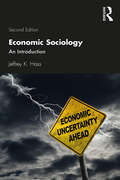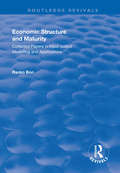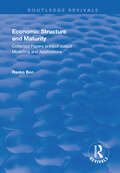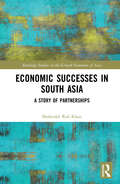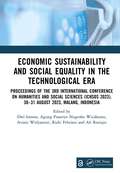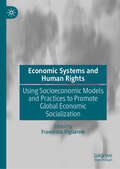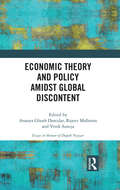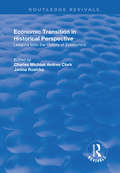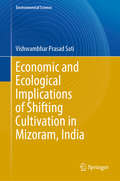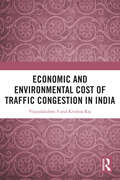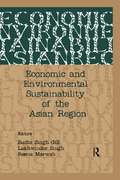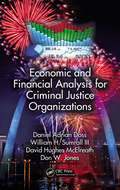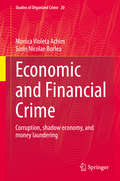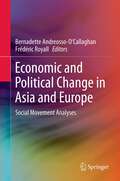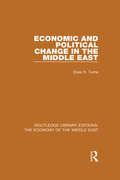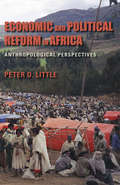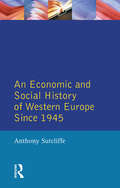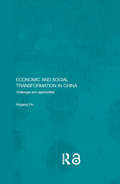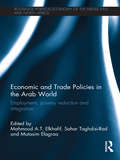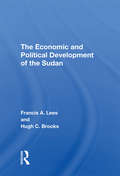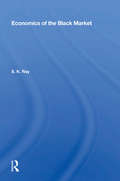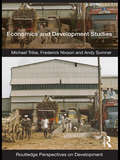- Table View
- List View
Economic Sociology: An Introduction
by Jeff HassThis insightful key resource presents the clearest, most comprehensive and wide ranging account of economic sociology to date. Hass presents a critical and sophisticated yet approachable analysis of economic behaviour and phenomena. He makes the insights, claims, and logic of economic sociology interactive and accessible to students, while exposing the realities of today’s complex economic world and the challenges of studying economies and societies. This introductory text: provides a sophisticated yet approachable analysis of economic behaviour and phenomena explores economic structures and change from a global perspective-by using comparisons and data from the United States, Europe, East Asia, Latin America, and post-socialist countries shows how domestic and international economic forces work over time to shape modern economies takes a critical perspective of both economic sociology and economics to establish useful insights presents historical narratives showing the development of today’s economic structures and institutions addresses important economic issues directly impacting on students’ lives—from the more visible (economic inequality and organizations) to the less visible (international economic trends, public policy, post-socialism). Incorporating illustrations, case studies, a glossary, chapter notes, and a comprehensive bibliography, this student-friendly text also puts forward suggestions for further project work by showing the reader areas that require further investigation.
Economic Sociology: An Introduction
by Jeff HassEconomic Sociology provides the clearest and most comprehensive account of the promises of economic sociology. It shows how economies are more than supply-and-demand curves, individual profit motives, and efficient performance: they are forms of power and structure, grounded in institutions and culture. What is calculated, how, and why? Are profit and efficiency always so central to economic structures and outcomes? What shapes change and reproduction in economic practices and policies? How have classes and states, using power and institutions, created and continue to shape the economic world we live in? This second edition presents a critical and sophisticated yet approachable analysis of economic behavior and phenomena. After describing key concepts and logics of economic sociology and of economics (its eternal cousin and competitor), Hass turns the sociologist’s analytic eye to the heart of economic practices comparing how they work in the United States, Europe, East Asia, Latin America, and post-socialist Russia and China. The volume addresses crucially important economic issues that touch our well-being and justice: the rise and structuring of capitalism; relations between states and economies; economic policies; economies and inequality; and organizations and corporations. Causes and consequences of globalization and the Great Recession are laid out for the reader. With economics and economic sociology placed side-by-side in this journey of how economies operate in the past and present, the reader gets different perspectives on economic reality. Power and culture, institutions and fields, classes and corporations interact on this historical and global stage. Written in a clear and direct style, this textbook will appeal to students and scholars in economic sociology, sociology of work, economics, social policy, political economy and comparative sociology
Economic Structure and Maturity: Collected Papers in Input-output Modelling and Applications (Routledge Revivals)
by Ranko BonThis title was first published in 2000: A collection of Ranko Bon's papers on input-output analysis and its applications. The underlying feature of the papers is a focus on the supply-side input-output model, which better predicts the behaviour of mature economic sectors, such as agriculture and mining, than the demand-sided model. The construction sector is especially relevant in the context of economic stability and maturity issues, as it offers an index of economic maturity for entire economies. This is the main theme that evolves through the papers collected in the book.
Economic Structure and Maturity: Collected Papers in Input-output Modelling and Applications (Routledge Revivals)
by Ranko BonThis title was first published in 2000: A collection of Ranko Bon's papers on input-output analysis and its applications. The underlying feature of the papers is a focus on the supply-side input-output model, which better predicts the behaviour of mature economic sectors, such as agriculture and mining, than the demand-sided model. The construction sector is especially relevant in the context of economic stability and maturity issues, as it offers an index of economic maturity for entire economies. This is the main theme that evolves through the papers collected in the book.
Economic Successes in South Asia: A Story of Partnerships (Routledge Studies in the Growth Economies of Asia)
by Shahrukh Rafi KhanThis book analyses economic successes in South Asia and the reasons why they emerge by offering an in-depth analysis of a few case studies against the backdrop of overall policy context and economic performance of these countries. Offering a brief comparative review of South Asia in a global context, the book shows that the region remains an economically and socially lagging region. The author argues that within South Asia, most countries demonstrate examples of economic or social success. This book explores such successes that provide lessons for other South Asian countries and beyond. Case studies include the textile industry and microcredit in Bangladesh, information technology in India, forestry management in Nepal, surgical and sports goods in Pakistan, and human development in Sri Lanka. At the macro level, the book discusses India’s catch-up growth first given the country’s global importance and because of the prominence of the debate on its catch-up growth to development economics. A novel addition to the literature with its focus on successful initiatives with broad policy implications, this book will be of interest to researchers in the field of development economics, development studies and South Asian Studies, in particular South Asian policy.
Economic Sustainability and Social Equality in the Technological Era: Proceedings of the 3rd International Conference on Humanities and Social Sciences (ICHSOS 2023), 30–31 August 2023, Malang, Indonesia
by Ali Roziqin Dwi Irawan Agung Prasetyo Nugroho Wicaksono Aviani Widyastuti Rizki FebrianiThis book is a comprehensive compilation of academic papers and presentations delivered at the conference. It brings together research from various disciplines within the humanities and social sciences, such as cultural studies, sociology, psychology, education, literature, and history.It meticulously covers several critical areas of study, reflecting the diverse and interdisciplinary nature of the conference. In the realm of post-pandemic economic development, it explores strategies for economic recovery and resilience, highlighting the role of finance and social capital in rebuilding economies. Technology and sustainable cities are examined through case studies and theoretical frameworks that discuss smart city initiatives, technological integration, and sustainability practices. The section on economic development, accountability, and finance risk delves into methods for ensuring transparency and managing financial uncertainties in a globalized economy. Social and environmental policies and planning are addressed with a focus on creating equitable and sustainable communities.This text will be valuable to academics, researchers, and students in the fields of humanities and social sciences.The Open Access version of this book, available at http://www.taylorfrancis.com, has been made available under a Creative Commons [Attribution-Non Commercial-No Derivatives (CC-BY-NC-ND)] 4.0 license.
Economic Systems and Human Rights: Using Socioeconomic Models and Practices to Promote Global Economic Socialization
by Francesco VigliaroloEconomic systems driven by monetary interests have enabled individuals, international institutions, and governments to prioritize financial gain and budget constraints over people. This has placed global dominance above human rights. This edited volume tackles the relationship between human rights and economic systems, providing new ways to help countries prioritize human rights in their economies. It includes contributions from scholars actively involved with the UNESCO Chair in Economic Systems and Human Rights, founded at the National University of La Plata. These contributors specialize in a range of topics within different disciplines, including economics, sociology, history, geography, law, and philosophy. Providing historical insights into past and present conditions, the contributors explore the best ways to reform modern economic systems to ensure they promote human rights. The first half of the book includes theoretical proposals and underlying themes, while the second half offers concrete models and practices for use in today’s dominant economic systems. Unique contributions within chapters include frameworks readers can use to apply socioeconomic theory at both national and international levels. The book examines structural problems such as socio-environmental crises, increased rates of inequality, and gaps between the economy and society. It discusses the transformation of dominant socio-economic theory as it relates to financial systems, productive labor markets, social participation, and the relationship between the economy, society, and the environment. Chapters directly address the loss of the ontological function in economies and propose new approaches to existing economic systems, drawing on scholars such as Adam Smith, who is well-known for his idea of the “invisible hand.” The resulting book presents a modern approach to national and international well-being built around human rights. Readers will learn about the socioeconomic models and practices that best promote economic socialization and how this relates to global values shared across economies.
Economic Theory and Policy amidst Global Discontent: Essays In Honour Of Deepak Nayyar
by Ananya Ghosh Dastidar Rajeev Malhotra Vivek SunejaThis book rethinks economic theory and calls for a creative and pragmatic approach to policymaking. It examines what development and sustenance of economic progress mean, and how these may be facilitated. The relevance of this issue has received fresh impetus from the significant changes in the degree and pattern of international economic relations that are unfolding across the world, posing both opportunities and challenges. While globalisation of goods and financial markets may have delivered high growth for some nations, the distribution of the benefits has often been highly unequal, with gains to owners of capital and skills being disproportionately higher compared to that of labour, especially the unskilled. Widening and persistent inequalities have been at the heart of rising polarisation and spread of conflicts that threaten the social fabric. This work emphasises the relevance of a broad policy framework based on building individual capabilities and in line with a human-centric perspective. At the same time, it points out the crucial need to create policy space for macroeconomic stability and to accommodate heterodox influences, especially when conventional wisdom proves inadequate, as starkly demonstrated inter alia during the recent global financial crisis. This festschrift, dedicated to Deepak Nayyar, presents chapters on diverse themes that address the persisting global problems of poverty, inequality and sustaining development. The book will be of great interest to scholars and researchers of economics, development studies, public policy and governance, and also to policymakers, government officials and those in media.
Economic Transition in Historical Perspective: Lessons From The History Of Economics (Routledge Revivals)
by Charles Michael Andres Clark Janina RosickaThis title was first published in 2001. This volume of essays studies the problem of transition in economics from a historical perspective. It uses historical ideas and theories in a modern context to examine economic thought. It aims to show that social and historical context are important when considering economic transitions.
Economic Woman
by Deanna K. KreiselThe ways in which women are portrayed in Victorian novels can provide important insights into how people of the day thought about political economy, and vice versa. In Economic Woman, Deanna K. Kreisel innovatively shows how images of feminized sexuality in novels by George Eliot and Thomas Hardy reflected widespread contemporary anxieties about the growth of capitalism. Economic Woman is the first book to address directly the links between classical political economy and gender in the novel. Examining key works by Eliot and Hardy, including The Mill on the Floss and Tess of the d'Urbervilles, Kreisel investigates the meaning of two female representations: the 'economic woman,' who embodies idealized sexual restraint and wise domestic management, and the degraded prostitute, characterized by sexual excess and economic turmoil. Kreisel effectively integrates economic thought with literary analysis to contribute to an ongoing and lively scholarly discussion.
Economic and Ecological Implications of Shifting Cultivation in Mizoram, India (Environmental Science and Engineering)
by Vishwambhar Prasad SatiThis book presents the first empirically tested, comprehensive study on shifting cultivation in Mizoram. Shifting cultivation is a unique and centuries-old practice carried out by the people of Mizoram in Northeast India. Today, it is a non-economic activity as it does not produce sufficient crops, and as a result, the area under shifting cultivation is decreasing. Such cultivation leads to the burning and degradation of vast areas of forestland and therefore has adverse impacts on the floral and faunal resources. This book is a valuable resource for government workers, policymakers, academics, farmers and those who are directly or indirectly associated with practical farming, or with framing and implementing policies. It is equally important to master’s and Ph.D. students of geography, resource management, development, and environmental studies who are involved in research and development.
Economic and Environmental Cost of Traffic Congestion in India
by Krishna Raj Vijayalakshmi S SThis book explores one of the most prevailing problems of the contemporary urban world, i.e. traffic congestion and its economic, environmental, and health implications. Generally viewed as an urban menace, the problem of traffic congestion has huge economic implications, which are often overlooked by urban planners. This book examines and quantifies the costs and adverse consequences and of traffic congestion, which include emissions, loss of productive hours, fuel wastage, and the adverse effects on the health of commuters, among others. It provides a comprehensive and scientific understanding of the underlying problems of traffic gridlocks by analyzing empirical evidence from Bengaluru, a city in South India. It also offers solutions and highlights innovative measures that draw from both economic and engineering perspectives to counter and reduce the tangible and intangible costs of traffic conjestion. This book will be of interest to both academic and non-academic readers of economics, environmental economics and econometrics, transport economics, urban planning, transport geography, as well as planners and policy makers.
Economic and Environmental Sustainability of the Asian Region
by Lakhwinder Singh Reena Marwah Sucha Singh GillAsian economic development and environmental consequences are not only crucial for the wellbeing of the people, but are of great relevance for the global economy. The ongoing intense debate on carbon emission mitigating strategies for reducing the impact of environmental consequences has undermined the principle of equity and put a question mark on the sustainability of the development process of the most dynamic Asian economies. This volume explores fresh perspectives on the issues of wellbeing, Asian economic development and environmental concerns. The book is organised along six themes: issues in sustainability of Asian agriculture; ecological concerns in theory and practice; core themes in economic development; resource management and policy alternatives; discrimination and socio-economic equity in development; and peasant distress and sustainability of cotton economy. The articles are based on unique quantitative data and a rigorous analytical framework for examining policies for an equitable economic and environmental international regime.
Economic and Financial Analysis for Criminal Justice Organizations
by Daniel Adrian Doss William H. Sumrall III David H. McElreath Don W. JonesFrom small law offices to federal agencies, all entities within the justice system are governed by complicated economic factors and face daily financial decision-making. A complement to Strategic Finance for Criminal Justice Organizations, this volume considers the justice system from a variety of economic and financial perspectives and introduces
Economic and Financial Crime: Corruption, shadow economy, and money laundering (Studies of Organized Crime #20)
by Monica Violeta Achim Sorin Nicolae BorleaThis book deals with the widespread economic and financial crime issues of corruption, the shadow economy and money laundering. It investigates both the theoretical and practical aspects of these crimes, identifying their effects on economic, social and political life. This book presents these causes and effects with a state of the art review and with recent empirical research. It compares the international and transnational aspects of these economic and financial crimes through discussion and critical analysis. This volume will be of interest to researchers and policy makers working to study and prevent economic and financial crime, white collar crime, and organized crime.
Economic and Human Development in Contemporary India: Cronyism and Fragility (Routledge Contemporary South Asia Series #Vol. 23)
by Debdas BanerjeeThis book deals with issues in economic development in India. It highlights those factors that are indicative of India’s emergence in the global economy yet indicates negative "trickle down" effects, such as malnutrition, poverty, bonded labourers, high adult unemployment and the widespread use of child labour. Focusing on structural deficiencies for a steady growth rate, and how to make growth inclusive, the book examines duality in development and the factors standing between national economic prosperity and human development. The author analyses issues concerning international trade, technology, access to food, inequality and poverty, and the "catching up" of developing countries. A novel approach to the analysis of the Indian economy and other developing countries in the 21st century, this book advocates development as a form of governance. With India as a case study, this book provides a solid framework for looking at developing economies which will be useful to policy-makers and to graduate and post-doctoral students and researchers in the areas of development studies and economics, industrialisation and structural change.
Economic and Political Change in Asia and Europe
by Frédéric Royall Bernadette Andreosso-O'CallaghanSince the 1973 publication of Alain Peyrefitte's prophetic When China Awakens, developments in East Asia have outstripped even the wildest predictions. China has undergone the fastest industrialization and urbanization process in history, yet tensions there are rising as some realize how far they have been left behind. This volume explores the applicability of European economic and social models to our analysis of East Asia's and, in particular, China's situation. Though millions of Chinese and other Asian people have been lifted out of poverty, inequality is rising nonetheless, and contemporary Europe and Asia are both witnessing collective action against rampant economic neoliberalism in the former and the exclusion of minorities in the latter. It is difficult to overstate the relevance of this assessment, which seeks answers to some central questions: Can events in Europe serve as a model for those in East Asia? Are there similarities or differences between the two regions? To what extent do political, economic or social systems stimulate or inhibit collective action? How culturally equivalent are the collective actions of marginalized/ disadvantaged people in the two locations, or are events in Europe symptomatic of specific cultural attributes? Comparing and contrasting the research tools and dominant paradigms in the social and economic sciences in East Asia and Europe, as this volume does, throws out some revealing results.
Economic and Political Change in the Middle East (Routledge Library Editions: The Economy of the Middle East)
by Elias H. TumaIn the early 1960s the Middle East suffered from political instability, inefficiency of government, widespread poverty and inequality, low productivity, and a mounting population pressure on the region’s resources. With the exception of some of the oil-exporting countries, the entire region still suffers from these same burdens. There have been many studies in the economic development and industrialization of the region in recent years. This study is different, motivated by scepticism and a sense of intellectual frustration and apprehension because of the apparent inadequacy of socioeconomic and political development in the Middle East. First published in 1987.
Economic and Political Reform in Africa
by Peter D. LittleWhat are the local effects of major economic and political reforms in Africa? How have globalized pro-market and pro-democracy reforms impacted local economics and communities? Examining case studies from The Gambia, Ghana, Mozambique, Kenya, Ethiopia, and Somalia, Peter D. Little shows how rural farmers and others respond to complex agendas of governments, development agencies, and non-governmental organizations. The book explores the contradictions between what policy reforms were supposed to do and what actually happened in local communities. Little's bold vision of development challenges common narratives of African poverty, dependency, and environmental degradation and suggests that sustainable development in Africa can best be achieved by strengthening local livelihoods, markets, and institutions.
Economic and Social History of Western Europe since 1945, An
by Anthony SutcliffeThis is the ideal companion text to A Political History of Western Europe Since 1945. It is an introductory survey which explains how western Europe built up its postwar prosperity and is moving towards continental integration. Themes treated include: the origins of the EC; consumerism; youth culture and protest; immigration; the oil crisis and its aftermath; and the contrasting experience and expectations of the Nordic world and the Mediterranean south. The book ends with the consequences of Soviet collapse. Designed for general history students, it assumes no formal knowledge of economics, and is notably accessible and user-friendly in its approach.
Economic and Social Transformation in China: Challenges and Opportunities (Routledge Studies on the Chinese Economy #Vol. 23)
by Angang HuThe Center for China Studies is among China’s most influential think-tanks, and its China Studies Reports are read at the highest levels of government. Now for the first time, the most important of these reports is collected in book form in English, providing a fascinating insight into the challenges and opportunities for Chinese development and the government’s thinking on economic and social issues. Including comparative studies with developed and developing nations, analysis of past economic performance and future trends, and effects of demographic shifts such as population ageing and urbanization, this book is an essential collection of research and includes notes made by central party leaders. Compiled by the founder of the Center for China Studies, one of the country’s leading economists, this book is key to understanding Chinese development and the likely future path of government policy.
Economic and Trade Policies in the Arab World: Employment, Poverty Reduction and Integration (Routledge Political Economy of the Middle East and North Africa)
by Mahmoud A.T. Elkhafif Sahar Taghdisi-Rad Mutasim ElagraaThe Arab Spring and recent popular uprisings that have taken place in many Arab countries since the end of 2010 highlight the urgent need for economic policy reorientation in these countries. This book addresses key issues relevant to the contemporary economic realities of the Arab economies; including policy space, generation of more productive and decent employment, social justice and poverty alleviation, regional integration and the common destiny of the Arab people, and the failure of the structural adjustment programs recommended by the Bretton Woods institutions and implemented in these countries in the last three decades. The volume explores, and makes recommendations, for deep pan Arab regional integration and alternative pro-poor, growth-oriented economic and trade policies capable of promoting social justice by reducing the incidence of poverty. It highlights the ways in which various types of economic and trade policies have affected the levels of employment and poverty in five Arab countries: Egypt, Jordan, Morocco, the occupied Palestinian territory and Sudan. Using a mixture of qualitative and quantitative methodologies, the book focuses on Arab trade integration, exploring the obstacles to its implementation in the past, as well as its potentials as a source of employment generation and enhancement of living conditions. The book also addresses the construction, interpretation and use of quantitative trade indicators for optimal policy choice at both the domestic and regional levels.
Economic-pol Dev Sudan/h
by Francis A. LeesThe purpose of this volume is to focus attention on the economic and political development of the Sudan, to describe the progress and problems encountered in this development process, and to bring into a single book a comprehensive consideration of the situation in the Sudan. In terms of land area the Sudan is the largest nation in Africa, and one of the most sparsely populated countries in Africa. The Sudan enjoys a strategic location, commanding part of the Red Sea approach to the Suez Canal, and lying in close proximity to the rapidly growing Middle Eastern markets. Complementary aspects of food supply in the Sudan and the Middle East - the Sudan with its potential surplus - the Middle East with its needs - suggest a dynamic export growth pattern in the future.
Economics Of The Black Market
by S. K. RayIn this first serious study of the economics of the black market, S. K. Ray looks in-depth at profiteering, black money, fraud, smuggling, government corruption, and the overall structure of the black market.
Economics and Development Studies
by Andy Sumner Michael Tribe Frederick NixsonDevelopment studies textbooks and courses have sometimes tended to avoid significant economic content. However, without an understanding of the economic aspects of international development many of the more complex issues cannot be fully comprehended. Economics and Development Studies makes the economic dimension of discourse around controversial issues in international development accessible to second and third year undergraduate students working towards degrees in development studies. Following an introductory chapter outlining the connections between development economics and development studies, this book consists of eight substantive chapters dealing with the nature of development economics, economic growth and structural change, economic growth and developing countries, economic growth and economic development since 1960, the global economy and the Third World, developing countries and international trade, economics and development policy, and poverty, equality and development economists, with a tenth concluding chapter. This book synthesizes existing development economics literature in order to identify the salient issues and controversies and make them accessible and understandable. The concern is to distinguish differences within the economics profession, and between economists and non-economists, so that the reader can make informed judgments about the sources of these differences, and about their impact on policy analysis and policy advice. The book features explanatory text boxes, tables and diagrams, suggestions for further reading, and a listing of the economic concepts used in the chapters.

